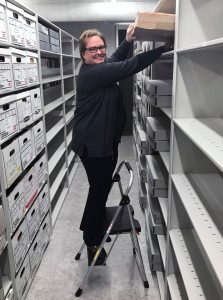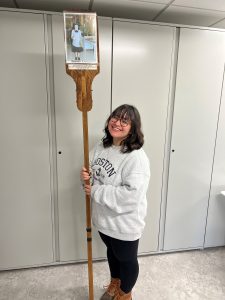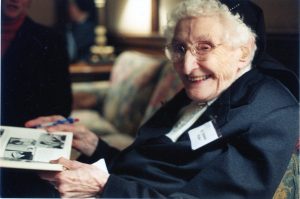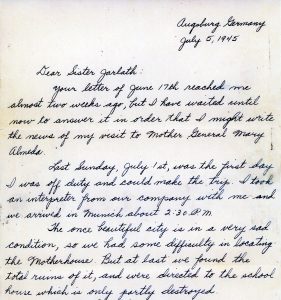October is American Archives Month, which was created to promote the value of archives and the importance of archivists. People often have misconceptions about what an archive is, and what archivists do. The public seems to have an image of archivists sitting in rooms pouring over old, dusty documents that they keep away from the public eye. Nothing could be further from the truth!
To celebrate American Archives Month, the staff at the School Sisters of Notre Dame North American Archives (NAA) explains what they do, and why they love it.
Michele Levandoski, Director
A few years ago, I received a call from a man asking for the name of his father’s first grade teacher. These types of requests aren’t unusual, but the story that followed has stayed with me all this time. The father stuttered as a child and was teased by the other students. He had just moved to a new school, and his teacher, a sister, told him to come after class every day, and she would work with him. She would do odd things like make the boy walk backwards while talking, or talk with marbles in his mouth. After a few months, his stutter had faded and he went on with his life.
The man said his father had told everyone in their family about this sister – his children, grandchildren, nieces, nephews. They all knew about the incredible teacher who took the time to help him as a child. The only problem was his father couldn’t remember the sister’s name. His father was now in his 90s, and his health was failing. His son wanted to give him the gift of her name.
I immediately got to work. The following day I called to let him know that not only did I figure out who the sister was, but I had a photo! The man was clearly emotional and finished the call by letting me know that this would mean so much to his father – to finally know the name of the sister who had made such an impact in his life that he never forgot her.
Every year the NAA staff answer more than 1,000 reference requests. Requests come from a variety of sources, but the majority are from former students who want to know what happened to their favorite teacher. If the sister is deceased, we send a copy of her obituary or other information so they can learn more about her life. They often reply to thank us for the information, and many times they will tell us what she meant to them.
We have heard beautiful stories of children who struggled in school, and a sister was the only person who really took the time to help; children who had a difficult home life, and a sister was the person they felt safe talking to; or they have great memories of running errands for the sister who cooked, and she would reward them with one of her amazing cookies!
When people ask me why I love being an archivist, my answer lies in these interactions. I am able to preserve the history for a group of amazing women who have had, and continue to have, a positive impact on the world. A lot of people view archives as a dusty place where old records are kept. In reality, it is a vibrant place where history is living and breathing. Every time someone contacts us looking for information about a sister, her life is remembered and the inquirer's life is made richer by her memory.
Tim Cary, Processing Archivist
Most people don’t bother to read the acknowledgements and prefaces of publications. I always read them because that is where archivists are sometimes thanked by authors for their assistance in the creation of the publication. I enjoy reading the acknowledgements because they allow me to see if colleagues I know are mentioned (and, occasionally, I see my name too). By reading these pages, one can also see the extent of research that was done while creating the final product. Archivists collect, catalog and provide access to records so that researchers can use them. To see that sequence fulfilled from beginning to end is what makes the profession so rewarding.
Archivists collect records in the hope that someday they will be used. Collecting has always been a challenging task for archivists because one must predict the kinds of records that researchers in the future might find useful. Collecting some records is obvious, but others not so much. For many years, archival repositories avidly collected politicians’ records. More recently, very few institutions collect that kind of thing. In the last 30 years or so, emphasis has been placed on material collected “from the bottom up,” that is, records created by people or organizations not traditionally thought of as important. The challenge of collecting records for future use is fascinating.
When a collection is added to an archives’ holdings, it has to be cataloged. Items can’t be made accessible until they have been cataloged. Cataloging records is another reason that I enjoy being an archivist. Collections do not come in perfect order, so the archivist must decide what to keep and what to discard. In any given collection, it is impossible to predict the contents, and the act of appraising a collection is always interesting.
Once a collection has been acquired and cataloged, the final step is to let prospective audiences know of its existence, so that it can be used. Today, the internet allows repositories to create websites on which information about newly available collections can be made instantly. What a revolution!
What I enjoy about being an archivist are the steps that must be taken to complete the process from acquisition to use. I like the challenge of speculating what records to collect to satisfy researchers, the actions involved in cataloging records and matching collections to researchers. At the end of these steps, I enjoy seeing archivists acknowledged by the folks who use our collections. It’s not the name in the acknowledgements that counts. It is the fact that being mentioned means that the process has worked. We got the right records into the right hands at the right time for others to produce a quality final product!
Grace Avila, Archives Assistant
I have always loved history, ever since I was a little girl. It was not until I started college that I realized I wanted to make a career out of it. The only problem was I didn’t know what was out there for me. In my junior year, I was introduced to archives. Up until that point, I had never even heard of them or knew what they did.
When I started working at the School Sisters of Notre Dame North American Archives, I was able to fully understand what an archive has and what can be done with the records. Researchers, historians and genealogists can come in or request information online. This way the archives are more accessible for all those who are looking for information about School Sisters of Notre Dame.
In my work, I’m able to analyze and learn history by way of the SSND. History isn’t just found in a textbook but in the experiences of the everyday people who lived it. The sisters left their mark with the books they wrote, the papers they signed and the chronicles they kept. Without these records, we couldn’t get the full picture of the lives lived by these women or properly tell their story. Along with their personal accounts, we also get to see a bigger picture of community life. These records show how the community reacted and responded to everyday challenges along with major historical events.
I’m very grateful to have this opportunity at such a young age and to learn and grow within this position. My hope is to continue serving SSND and preserving their history for generations to come.






